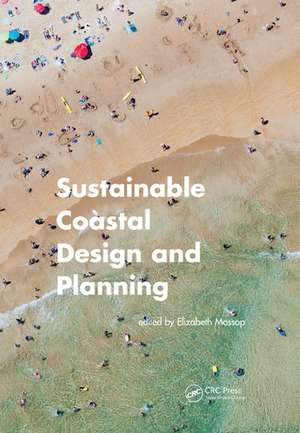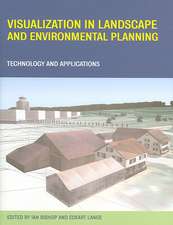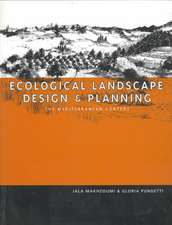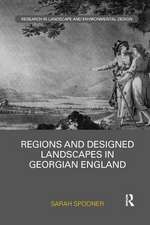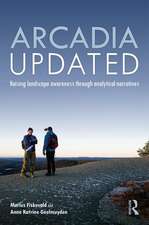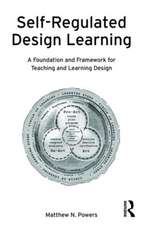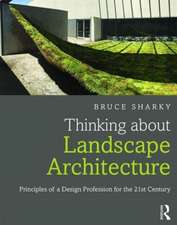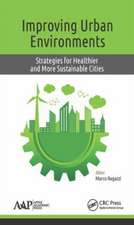Sustainable Coastal Design and Planning
Editat de Elizabeth Mossopen Limba Engleză Paperback – 30 iun 2020
Sustainable Coastal Design and Planning is an outstanding collection of essays by leading practitioners and academics from across the globe on design and planning for coastal resilience in the face of climate change. It thoroughly explores the questions of coastal change at different scales and provides international case studies that illustrate diverse strategies in different geographies and cultures. Taken as a whole, they canvas a broad palette of approaches and techniques for engaging these complex problems.
Divided in two parts, this book focuses on how to develop solutions through multidisciplinary design thinking and informs all stakeholders on specific methods and practices that will be needed to work effectively in this dynamic space.
| Toate formatele și edițiile | Preț | Express |
|---|---|---|
| Paperback (1) | 323.16 lei 6-8 săpt. | |
| CRC Press – 30 iun 2020 | 323.16 lei 6-8 săpt. | |
| Hardback (1) | 888.85 lei 6-8 săpt. | |
| CRC Press – 26 noi 2018 | 888.85 lei 6-8 săpt. |
Preț: 323.16 lei
Preț vechi: 362.05 lei
-11% Nou
Puncte Express: 485
Preț estimativ în valută:
61.84€ • 64.33$ • 51.06£
61.84€ • 64.33$ • 51.06£
Carte tipărită la comandă
Livrare economică 12-26 aprilie
Preluare comenzi: 021 569.72.76
Specificații
ISBN-13: 9780367570750
ISBN-10: 0367570750
Pagini: 470
Dimensiuni: 178 x 254 mm
Greutate: 0.97 kg
Ediția:1
Editura: CRC Press
Colecția CRC Press
ISBN-10: 0367570750
Pagini: 470
Dimensiuni: 178 x 254 mm
Greutate: 0.97 kg
Ediția:1
Editura: CRC Press
Colecția CRC Press
Public țintă
Academic and Professional Practice & DevelopmentCuprins
PART 1 NEW WAYS OF THINKING AND WORKING. Section I Shifting Realities. 1 Designing the Coast in the Moment of Rain. 2 Fraying at the Edges: On Coastal Life and Rising Seas. 3 (Re)Think (Re)Design for Resilience. 4 Resilience and the Translation of Expertise. Section II Methods and Practices. 5 The Joy of Counterintuitivity. 6 The Dutch "Room for the River" Program (2006–2017): Landscape Quality as a Binding Agent. 7 Drawing a Line in the Sand: Rebuild by Design, Mathematical Modeling, and Blue Dunes. 8 Designing Resiliency: Interdisciplinary Geovisualization for Complex Coastal Environments. 9 Best Practices for Interdisciplinary Collaboration for Coastal Resiliency. 10 Engaging the Community to Envision the Coastal Climate Future. PART 2 NEW STRATEGIES. Section III Deltas, Bays, and Estuaries. 11 Structures of Coastal Resilience: Adaptive Design for Jamaica Bay, New York. 12 Resilience and Coastal Ecosystems: Three Typologies, Three Design Approaches. 13 Resilience of Natural Systems and Human Communities in the Mississippi Delta: Moving beyond Adaptability Due to Shifting Baselines. 14 New Orleans, Coastal City. 15 The Giving Delta. 16 A Fine Dutch Tradition in the Noordwaard. 17 Thresholds and Contingencies: A Design Process for Regional Coastal Resilience. 18 The Mekong Delta: A Coastal Quagmire. Section IV Sites and Structures. 19 The New Hondsbossche Dunes. 20 Adaptive Landscapes for Coastal Restoration and Resilience in Contemporary China. 21 Going with the Flow: Building Resilience in Southeast Queensland. 22 Architectural Strategies for a Dynamic Coast. 23 The Hard Habitats of Coastal Armoring. 24 Armatures for Coastal Resilience.
Notă biografică
Elizabeth Mossop is Professor and Dean of the School of Design, Architecture and Building at the University of Technology Sydney (UTS). A landscape architect and urbanist with wide-ranging experience in both landscape design and urban planning, Mossop is a founding principal of Spackman Mossop Michaels landscape architects based in Sydney and New Orleans. Her professional practice concentrates on urban infrastructure and open space projects, such as the multiple award-winning Bowen Place Crossing in Canberra, Press Street Gardens in New Orleans, and Sydney’s Cook and Phillip Park. She has been involved in many aspects of the post-hurricane reconstruction of New Orleans and the Gulf Coast and the ongoing revitalization of Detroit.
With an academic career spanning 25 years, Mossop has held key roles at universities in both the United States and Australia. Before joining UTS, she was Professor of Landscape Architecture and Director of the Robert Reich School of Landscape Architecture at Louisiana State University, one of the highest-ranked landscape architecture programs in the United States. Previously, she was the Director of the Masters of Landscape Architecture program at the Harvard Graduate School of Design.
Her research and teaching focuses on landscape and urbanism, through investigation of contemporary landscape design both at the urban scale and at the site scale. Previous publications include Contemporary Landscape Design in Australia (BT Latitude, Sydney, 2006); Hong Kong: Defining the Edge (Harvard Graduate School of Design, Cambridge, MA, 2001); and City Spaces: Art and Design (Craftsman House, Sydney, 2001).
With an academic career spanning 25 years, Mossop has held key roles at universities in both the United States and Australia. Before joining UTS, she was Professor of Landscape Architecture and Director of the Robert Reich School of Landscape Architecture at Louisiana State University, one of the highest-ranked landscape architecture programs in the United States. Previously, she was the Director of the Masters of Landscape Architecture program at the Harvard Graduate School of Design.
Her research and teaching focuses on landscape and urbanism, through investigation of contemporary landscape design both at the urban scale and at the site scale. Previous publications include Contemporary Landscape Design in Australia (BT Latitude, Sydney, 2006); Hong Kong: Defining the Edge (Harvard Graduate School of Design, Cambridge, MA, 2001); and City Spaces: Art and Design (Craftsman House, Sydney, 2001).
Recenzii
"Sustainable Coastal Design and Planning thoroughly explores the questions of coastal change at different scales and provides international case studies that illustrate diverse strategies in different geographies and cultures. Taken as a whole, they canvas a broad palette of approaches and techniques for engaging these complex problems. Divided in two parts, Sustainable Coastal Design and Planning focuses on how to develop solutions through multidisciplinary design thinking and informs all stakeholders on specific methods and practices that will be needed to work effectively in this dynamic space."
--Jack Mason, The Midwest Book Review
--Jack Mason, The Midwest Book Review
Descriere
This book discusses contemporary ideas about planning and design for coastal resilience. It provides an alternative presentation of the issues and solutions and examines strategies that work with natural processes to incorporate water into the urban environment, designing places and structures that can accommodate flooding and water storage.
